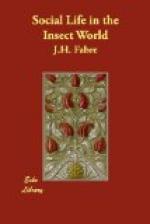To encounter among the Hymenoptera, those ardent lovers of flowers, a species which goes a-hunting on its own account is, to say the least of it, astonishing. That the larder of the larvae should be provisioned with captured prey is natural enough; but that the provider, whose diet is honey, should itself devour its captives is a fact both unexpected and difficult to comprehend. We are surprised that a drinker of nectar should become a drinker of blood. But our surprise abates if we consider the matter closely. The double diet is more apparent than real; the stomach which fills itself with the nectar of flowers does not gorge itself with flesh. When she perforates the rump of her victim the Odynerus does not touch the flesh, which is a diet absolutely contrary to her tastes; she confines herself to drinking the defensive liquid which the grub distils at the end of its intestine. For her this liquid is doubtless a beverage of delicious flavour, with which she relieves from time to time her staple diet of the honey distilled by flowers, some highly spiced condiment, appetiser or aperient, or perhaps—who knows?—a substitute for honey. Although the qualities of the liquid escape me, I see at least that Odynerus cares nothing for the rest. Once the pouch is emptied the larva is abandoned as useless offal, a certain sign of non-carnivorous appetites. Under these conditions the persecutor of Chrysomela can no longer be regarded as guilty of an unnatural double dietary.
We may even wonder whether other species also are not apt to draw some direct profit from the hunting imposed upon them by the needs of the family. The procedure of Odynerus in opening the anal pouch is so far removed from the usual that we should not anticipate many imitators; it is a secondary detail, and impracticable with game of a different kind. But there may well be a certain amount of variety in the means of direct utilisation. Why, for example, when the victim which has just been paralysed or rendered insensible by stinging contains in the stomach a delicious meal, semi-liquid or liquid in consistency, should the hunter scruple to rob the half-living body and force it to disgorge without injuring the quality of its flesh? There may well be robbers of the moribund, attracted not by their flesh but by the appetising contents of their stomachs.
As a matter of fact there are such, and they are numerous. In the first rank we may cite that hunter of the domestic bee, Philanthus aviporus (Latreille). For a long time I suspected Philanthus of committing such acts of brigandage for her own benefit, having many times surprised her gluttonously licking the honey-smeared mouth of the bee; I suspected that her hunting of the bee was not undertaken entirely for the benefit of her larvae. The suspicion was worth experimental confirmation. At the time I was interested in another question also: I wanted to study, absolutely at leisure, the methods by which




